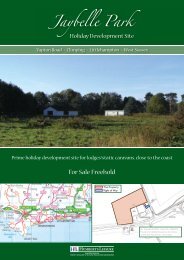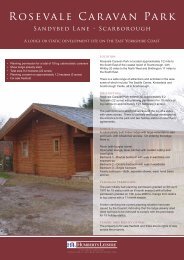0835 Leisure Summer 08_aw.indd - HLL Humberts Leisure
0835 Leisure Summer 08_aw.indd - HLL Humberts Leisure
0835 Leisure Summer 08_aw.indd - HLL Humberts Leisure
- No tags were found...
You also want an ePaper? Increase the reach of your titles
YUMPU automatically turns print PDFs into web optimized ePapers that Google loves.
Coastal erosionPitch banking is another approach put forward in the 2003 reportwhere sites would be available, not for a single park to relocate, butfor park owners losing pitches to erosion to develop a number ofreplacement pitches on that site. Whilst this in part addresses someof the financial concerns, it means that park owners have to adopta different operational approach to managing their units and bringsoperational problems such as how would the occupants of the pitchbank site access the facilities that they would normally expect fromthe main site.Despite the recognition of the problem and the Council’s stated aimsto work towards a resolution, many site owners feel that they have norealistic way forward.One client particularly frustrated by the current approach toapplications for site extension under rollback policy has a parksituated directly on the coastline and has suffered significant lossesas a result of coastal erosion. Around 80 static caravan pitches havebeen lost since 1980, 44 of these in the last 17 years. Recent stormsin October 2007 led to further cliff collapse as the photographsdramatically illustrate.Seeking to address the problem by approaching the Council forplanning permission to re-site the caravans at risk, he applied todevelop land to the west of the park and this application was refusedon the grounds that the distance between the cliffs and the re-sitedpitches was less than that required (based on the current rate oferosion) to last the life time of the caravans. He then amended hisproposals to reduce the number of pitches to be re-sited in orderto achieve the required distance of 165m (equivalent to 61 years).The Council did not support these proposals, stating that they werenot sustainable as they sought to extend the park laterally alongthe coastline and therefore did not strictly represent a roll backproposal. A further alternative to re-site the caravans on land outsideand to the north of the town was also turned down being deemedunacceptable due to its location in the open countryside, the lack offacilities close by, the need for extensive screening, and the possibleimpact on adjacent land use.This leaves the site operator in the unenviable position of havingtried all avenues to re-locate lost and at-risk pitches, and now havingto watch the southern half of the park crumbling into the sea.There is little evidence in this tale of the Council’s support forrollback policy and recognition of the importance of the holidaycaravan parks to the local economy. It would seem that the restrictiveapproach of the old, adopted Local Plan policies are still very muchto the fore.There are many parks affected in this way and we have a number ofclients experiencing difficulties tackling the issue of erosion of their sites.Effect on the local economyThe effect on the local economy of these lost pitches is massive andit is important that the Council is made to recognise this. Takingthe numbers at our site above, for example, using data providedby the UK Tourism Survey of 2006 for the Yorkshire Region, it iscalculated that the most recent loss of 44 pitches will result in a lossof £198,145 in visitor spending each year, increasing to a loss of£360,264 each year if calculated on the basis of the total numberof 80 pitches lost since 1980. Couple this with the damage to otherholiday parks along this coastline and is it is clear that the localeconomy is losing millions of pounds in tourism revenue with furtherimpact on the viability of local retail businesses and the demand forlocal jobs.Local Development Framework consultationConsultation on the Issues and Options for the Core Strategy DPDis currently underway. The Council will be including discussion ofthe general approach to rollback policy for caravan sites in the CoreStrategy so this will be an important opportunity for operators tomake their views known to the Council during this first stage of theprocess. More detailed consideration of the actual rollback policieswill form part of the Development Control Policies DPD and workon this document is not scheduled until 2009.SummaryDespite the problems of coastal erosion and loss of settlements tothe sea dating back to Roman times, the move to develop a planningpolicy approach to deal with the issue is very recent.East Riding of Yorkshire Council has endorsed the 2003 reportcommissioned on rollback policy and stated its support for theholiday park industry in this area. However, there is currently apolicy vacuum with applications being determined each case on theirmerits using adopted Local Plan policies which do not reflect thecurrent thinking, and the timescale for adopting new developmentcontrol policies to tackle the issue at least two years ahead. Withthe coastal erosion rates averaging 1.5m a year, this is time manypark operators simply do not have and we can only hope that theCouncil’s initial work on the Core Strategy DPD will lead to a morepositive approach for those operators needing to relocate now.ContactRachel Whaley BSc(Hons) DipTP MRTPI, Skiptone: rachel.whaley@humberts-leisure.com t: +44 (0)1756 799 271Simon Davis BA(Hons) DipTP MRTPI, Skiptone: simon.davis@humberts-leisure.com t: +44 (0)1756 799 27142 <strong>Summer</strong> 20<strong>08</strong>
















